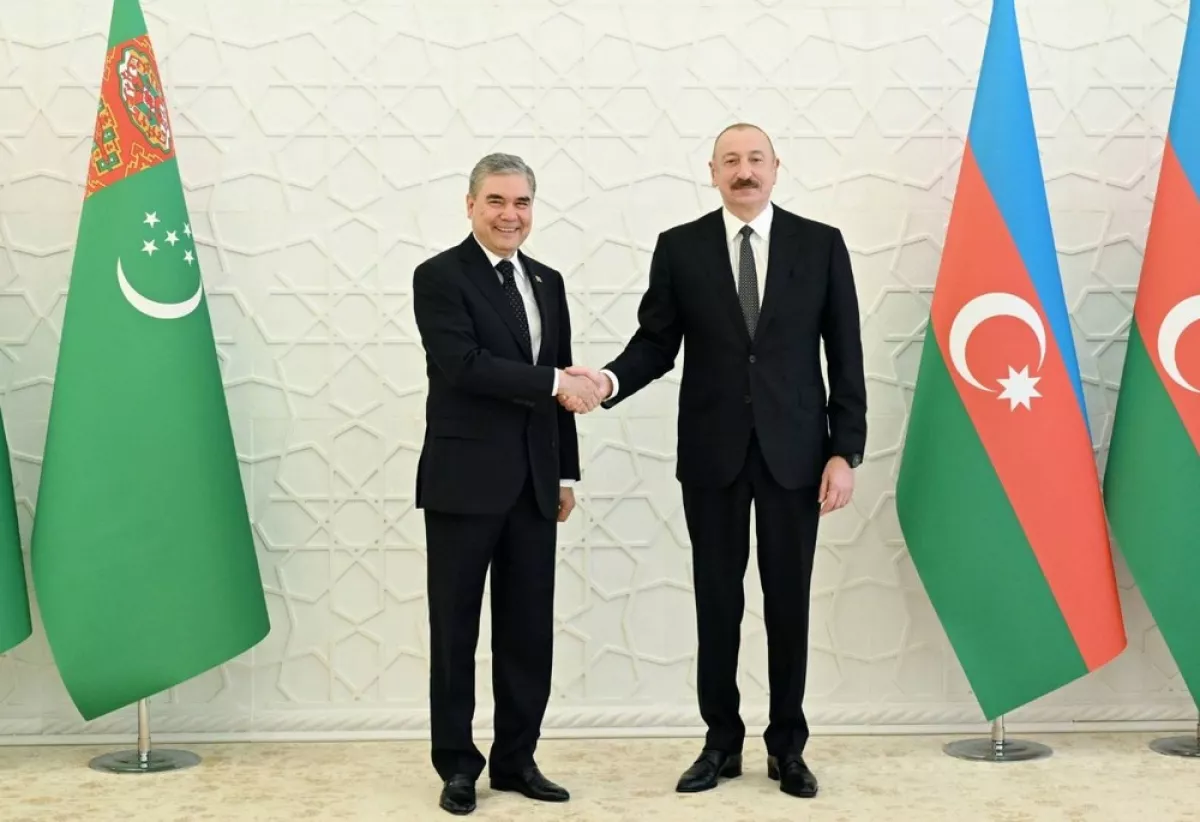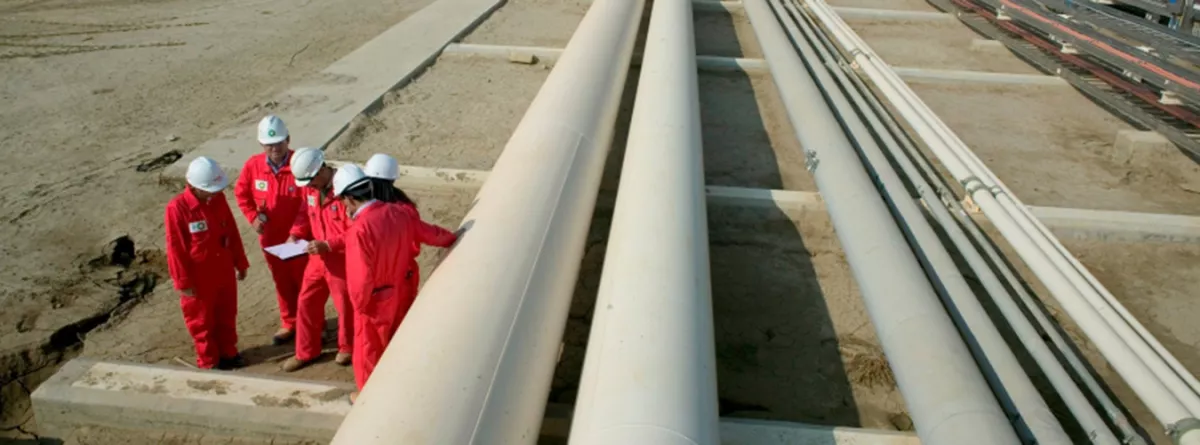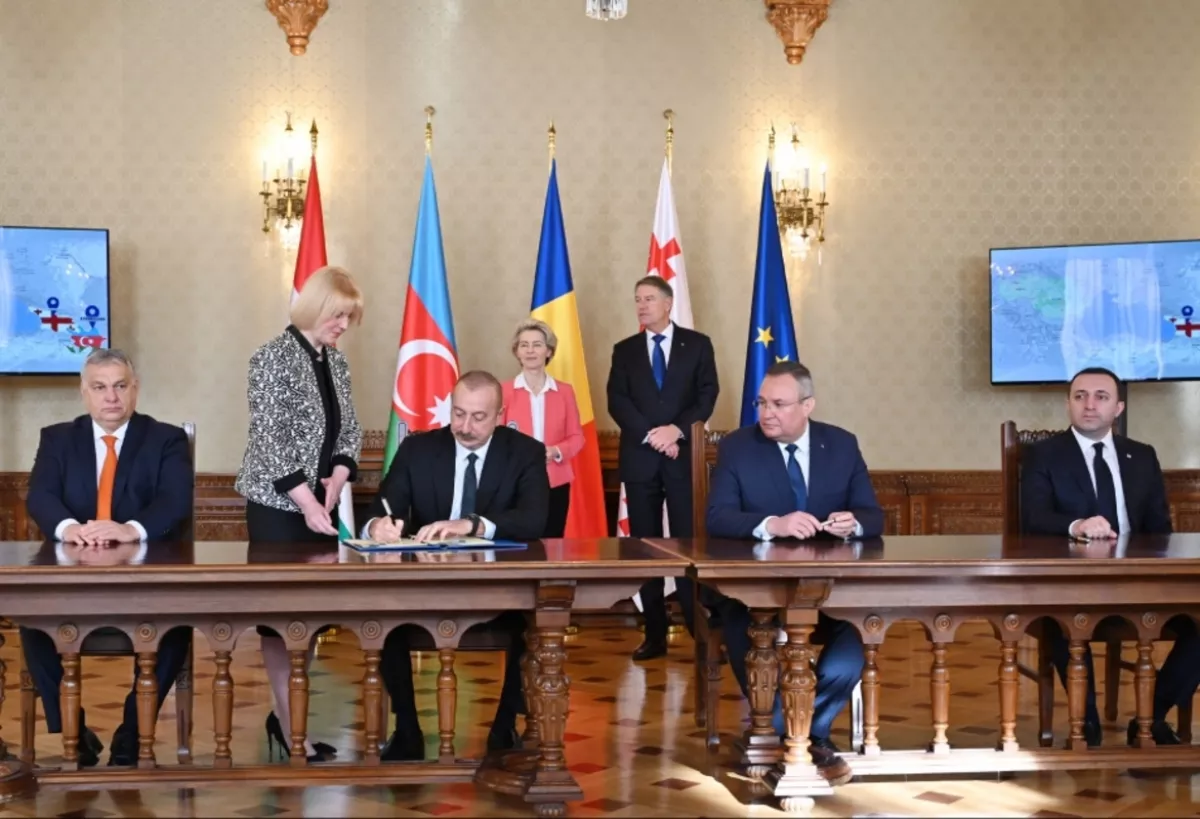Azerbaijan, Turkmenistan deepen strategic connectivity Trans-Caspian synergy
In recent years, Azerbaijan has been rapidly strengthening its business ties with Central Asian countries on both multilateral and bilateral levels. At the heart of this integration drive are key energy and transport-logistics projects, including significant cooperation between Azerbaijan and Turkmenistan.
Today, the partnership between Baku and Ashgabat is developing dynamically, built on a strong foundation of mutual understanding and trust between the leadership of the two nations. Recent achievements across economic, humanitarian, and other fields, as well as future prospects for Azerbaijani-Turkmen cooperation, were highlighted during the visit to Azerbaijan of Gurbanguly Berdimuhamedov, the national leader of the Turkmen people and Chairman of the Halk Maslahaty of Turkmenistan.

“Our peoples are bound together by deep-rooted fraternal traditions, which have grown even stronger during the years of independence. We enjoy successful cooperation across numerous areas,” said Azerbaijani President Ilham Aliyev during a meeting with Chairman of the Halk Maslahaty of Turkmenistan Gurbanguly Berdimuhamedov. “We have achieved significant progress in political, economic, humanitarian, and other spheres, including transport and energy, and, of course, today we will exchange views on future cooperation.”
In turn, the Chairman of the Halk Maslahaty of Turkmenistan noted during the meeting that the main goal of his visit to Azerbaijan is to further strengthen and develop bilateral relations, consolidate the milestones already achieved, and provide impetus for the implementation of new projects and directions. Congratulating Azerbaijan on the recent successful holding of the 17th summit of the Organisation of Economic Cooperation in the city of Khankendi, the national leader of the Turkmen people recalled the successful development of bilateral trade and economic partnership, growth in both qualitative and quantitative indicators, and the expansion of traditional ties in culture, science, and education.
“We rely on a solid historical foundation, the commonality and kinship of our two peoples, mutual understanding of the need for each other, a clear vision of the strategic prospects for partnership, and a willingness to use our combined political, economic, and resource potential for the benefit of our peoples and states, their well-being, and prosperity,” said Gurbanguly Berdimuhamedov. “Thanks to the efforts of both sides, our interaction is distinguished by consistency and specificity; it is stable, sustainable, and shows good dynamics. The key decisive factor in this is the highest level of mutual understanding and trust achieved between the leaders of our countries. This allows us the opportunity to make the right and timely decisions on all issues of bilateral cooperation and ensure the implementation of the agreements reached.”

Cooperation between Baku and Ashgabat has been developing for many years across several key directions, the most important of which are energy and logistics. In particular, this concerns the long-established oil transit: in recent years, approximately 35 million tonnes of Turkmen oil have been exported to global markets via the Baku–Tbilisi–Ceyhan (BTC) pipeline. Within a parallel scheme, Turkmen oil products and fuel have also been exported to the world market through ferry-rail transshipment across Azerbaijan, destined for the Black Sea oil terminal at the Georgian port of Kulevi.
A very important factor strengthening cooperation in the energy sector is the memorandum of understanding signed in 2021, under which the two states plan to jointly explore and develop the previously disputed Caspian field known as Kapaz/Serdar, which has been mutually renamed Dostlug. A logical continuation of this trend was the discussion in November 2023 regarding SOCAR’s potential involvement in projects on other Turkmen fields. Following this trend, SOCAR is actively expanding cooperation with Turkmengaz and opened a representative office in Ashgabat in November 2023.
After Azerbaijan, Turkmenistan, and the Islamic Republic of Iran (IRI) signed a trilateral agreement in November 2021 to organise swap deliveries of “blue” fuel, Azerbaijani-Turkmen business ties were enriched by a new gas route. Since January 2022, Ashgabat has been transshipping on average 4.5 to 5 million cubic metres of Turkmen gas to the northeastern regions of Iran, and then, via a cross-border pipeline connecting the northwestern regions of the IRI with Azerbaijan, corresponding volumes of Iranian gas have been supplied to Azerbaijan. According to Iranian sources, since the summer of 2023, swap deliveries have increased to 7 million cubic metres per day. After a brief pause last year, the swap gas exchange resumed: from the beginning of 2025, Baku purchased 155.3 million cubic metres of gas from Ashgabat, amounting to 23.3 million US dollars.
The energy cluster remains the key foundation of Azerbaijani-Turkmen cooperation today, steadily expanding through other non-resource components. In particular, a promising vector of partnership between Baku and Ashgabat is cooperation in exporting electricity via the Black Sea Energy underwater power cable, laid along the Black Sea seabed, stretching 1,195 km with a capacity of 1,000 MW.

The agreement signed on December 17, 2022, by Azerbaijan, Georgia, Romania, and Hungary envisages the launch of a project in 2029 with an initial budget of 2.3 billion US dollars. This energy line is designed to supply electricity generated from renewable energy sources (RES) in Azerbaijan and Georgia to Europe. In the future, the plan is to expand electricity supplies via the energy bridge to the European Union by connecting Central Asian countries. The governments of Turkmenistan and Kazakhstan have already officially expressed their readiness to participate in laying the energy cable across the Caspian Sea and supplying electricity to the Black Sea Energy system.
Notably, Baku and Ashgabat intend to connect the western and eastern shores of the Caspian Sea with a fibre-optic internet cable, and expert-level work is currently underway to prepare a feasibility study for the project. It is worth recalling that five years ago, an interstate agreement was signed between Azerbaijan and Turkmenistan to lay a 300 km underwater optical cable line (Siyazan–Turkmenbashi) with a capacity of 2–4 terabits per second. This strategically important project aims to transport international internet traffic from Europe to Turkmenistan, and from there to Afghanistan, Pakistan, and other neighbouring countries.
In addition to raw materials and energy-related Trans-Caspian transit, Azerbaijan and Turkmenistan are actively cooperating in expanding the handling of non-oil cargo along the Middle Corridor, including through transport routes such as Lapis Lazuli and CASCA+. In recent years, the two countries have participated in joint projects aimed at digitising freight transport, simplifying cross-border and customs procedures, and reducing tariffs for maritime and railway services. These measures have contributed to the growth of multimodal freight traffic, including an increase in transit container handling volumes.
Notably, in an effort to diversify cargo transit routes—particularly container flows—a decision was recently made to redirect part of the traffic from the Trans-Caspian International Transport Route (TITR) through Turkmenistan. In this context, at the end of June 2025, the first freight block train departed from the city of Jinhua, located in China’s eastern Zhejiang province, for the Turkmenbashi port. Loaded with 100 standard containers carrying clothing, accessories, metal products, and other goods, the shipment is destined for the Port of Alat in Azerbaijan. This new transport route is expected to reduce the load on the existing logistics line between the ports of Aktau and Alat, while accelerating the transit of Chinese goods to the Turkish and European markets.
For similar purposes, under the Lapis Lazuli project—already in its sixth year of implementation—a transport corridor is being developed to link the city of Torghundi in Afghanistan’s Herat province with Ashgabat in Turkmenistan, and from there through the Caspian ports of Turkmenbashi and Alat, onward through Georgia to Türkiye. These combined (rail, road, and maritime) transit corridors connecting Azerbaijani and Turkmen ports are primarily focused on transporting non-oil cargo—such as non-metallic mineral raw materials, construction materials, nitrogen fertilisers, cotton textiles, dried fruits, and other agricultural products—to Turkish and European markets.
The expansion of energy and non-oil cargo transit and the implementation of joint projects have contributed to a significant increase in the dynamics of Azerbaijani-Turkmen trade. In 2023, trade turnover between the two countries grew by 75%, reaching nearly 800 million US dollars. Unfortunately, these record figures could not be maintained last year, as bilateral trade dropped to 400 million dollars.
It is difficult to predict how the current year will end, but between January and May 2025, trade turnover between Azerbaijan and Turkmenistan amounted to 118.5 million dollars. Experts attribute the decline in trade dynamics to fluctuations in hydrocarbon markets, which have driven down energy prices. Nevertheless, the potential for growth in bilateral business relations remains high, given the recent integration of the Turkmenbashi port into Chinese transit along the Trans-Caspian International Transport Route (TITR), the trilateral agreement on trade and economic cooperation signed in Awaza in December 2022, and the establishment of a working group focused on facilitating the supply of Turkmen gas to Europe.








